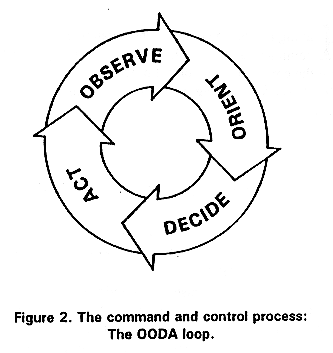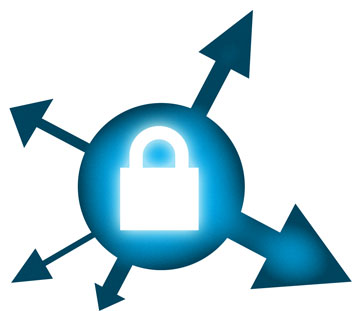September 05, 2013
The OODA thought cycle of the security world is around a decade -- Silent Circle releases a Secure Chat that deletes messages
 According to the record, I first started talking publically about this problem it seems in 2004, 9 years ago, in a post exchange with Bill Stewart:
According to the record, I first started talking publically about this problem it seems in 2004, 9 years ago, in a post exchange with Bill Stewart:
Bill Stewart wrote:> I don't understand the threat model here. The usual models are ... > - Recipient's Computer Disk automatically backed up to optical storage at night > - No sense subpoenaing cyphertext when you can subpoena plaintext.In terms of threats actually seen in the real world
leading to costs, etc, I would have thought that the
subpoena / civil / criminal case would be the largest.
...
In summary, one of the largest threats to real people out there is that things said in the haste of the moment come back to haunt them. So I wanted a crypto-chat system that caused the messages to disappear:
At 07:54 AM 9/17/2004, Ian Grigg wrote: >Ahhhh, now if one could implement a message that self- >destructed on the recipient's machine, that would >start to improve security against the above outlined >threat.
Think about the Arthur Anderson 'document destruction policy' memo, or as Bill goes on to list:
That's been done, by "Disappearing Inc". www.disappearing.com/ says they're now owned by Omniva. ... The system obviously doesn't stop the recipient from screen-scraping the message (don't remember if it supported cut&paste), but it's designed for the Ollie North problem"What do you mean the email system backs up all messages on optical disk? I thought I deleted the evidence!"or the business equivalent (anti-trust suit wants all your correspondence from the last 17 years.)
OK, so those are bad guys, and why would we want to sell our services to them? Hopefully, they are too small a market to make a profit (and if not, we're in more trouble than we thought,,).
No, I'm really thinking about the ordinary people, not the Ollie Norths of the world. The headline example here is the messy divorce, where SBTX drags out every thing you said romantically and in frustration over secure chat from 10 years ago. It's a real problem, and companies have tried to solve it:
However what gets interesting is when the sparks of anger not romance fly:If a couple breaks up, one of them may disconnect the service and all the data will be deleted.
But none of these have credibility of the security industry. They're all like Kim-dotcom efforts, which aim at serious problems, but fail to get to the real end.
Now, thankfully a company with serious security credibility has release a solution:
WASHINGTON, D.C. – September 3, 2013 – Silent Circle, the global encrypted communications firm revolutionizing mobile device security for organizations and individuals alike, today announced the availability of its Silent Text secure messaging and file transfer app for Android devices via Google Play. With the addition of Silent Text for Android, Silent Circle's apps and services offer unmatched privacy protection by routing encrypted calls, messages and attachments exclusively between Silent Circle users' iOS and Android devices without logging metadata associated with subscribers' communications.Silent Text for Android's features include:
- Burn Notice feature allows you to have any messages you send self-destruct after a time delay
- ...
[Jon Callas:] "Beyond strong encryption, our apps give users important, additional privacy controls, such as Silent Text's ability to wipe messages and files from a recipient's device with a 'Burn Notice.'"
Fantastic! We may not like the rest of Silent Circle's products or solutions, but finally we have serious cryptoplumbers deploying a really needed feature. Back to me, back to 2004:
As this threat is real, persistent and growing in popularity, the obsession of perfectly covering more crypto-savvy threats seems .. unbalanced?
Which leaves me wondering why it took so long to get the attention of the serious industry? This above quote measures the OODA loop in security threat thinking at around 9 years, so a decade, as opposed to quicker in-protocol threats. Which scarily matches the time it took to deploy TLS/SNI. And the time it is taking from phishing threat identification (around 2003) to understanding that HTTPS Everywhere was part of the solution (2005) to deployment of HTTPS Everywhere (2012++).
Why does the security industry clutch so fiercely to its quaint old notions of CIA as received wisdom and security done because we can do it? A partial answer is that we are simply bad at risk. Our society and by extension the so-called security industry cannot handle risk management, and instead chases headline threats and bogeymen, as Bruce Schneiers laments:
We need to relearn how to recognize the trade-offs that come from risk management, especially risk from our fellow human beings. We need to relearn how to accept risk, and even embrace it, as essential to human progress and our free society. The more we expect technology to protect us from people in the same way it protects us from nature, the more we will sacrifice the very values of our society in futile attempts to achieve this security.
He's hitting most of the bases there: risks from and to people, rather than dusty cold-war cryptographic textbooks; the technician's desire to eliminate risks 'perfectly' and ignore those he can't deal with; the adulation given to exotic technical solutions /versus/ the avoidance of risk as opportunity.
There is more: our inability to feel and measure risk accurately means we are susceptible to the dollar-incentivised snake-oil salesmen. Which leads to, liability and responsibility problems in what is termed the agency problem: we used to say that nobody ever got fired for buying IBM. During the 1990s, nobody ever got fired for implementing SSL.
In the 2000s, nobody ever got fired for increasing the budget for Homeland Security.
In the 2010s it seems, nobody will ever get fired for cyberwarfare. We continue as a society to be better at creating more risks for ourselves in the name of threats.
Posted by iang at September 5, 2013 05:02 AM | TrackBackOn a much larger scale and with images SnapChat does the same.
It's an image chat app that is apparently very popular with youngsters and is euphemistically called the Sexting app.
There is doubtfully a crypto component to it besides ssl. But images autoexpire quickly. You can still take screenshots though, which is the main problem with it.
Posted by: Pelle at September 5, 2013 07:02 AMI followed the OODA link to wikipedia to read up to its tenets, ending up in a presentation by J.R. Boyd himself: http://www.dnipogo.org/boyd/organic_design.pdf
At the third slide he states why security in c&c (army that is) is necessary: to remain unpredictable.
I find that goal hard to reconcile with "security" goals in civil society, where continuity, reliability and predictability are considered to be important virtues, at least for businesses.
The adversary perspective may be exists between competing businesses, but not between a business an its patronage. There the aforementioned virtues are paramount for success.
Posted by: Twan at September 5, 2013 09:29 AM